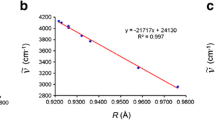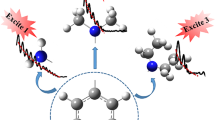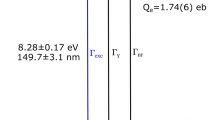Abstract
The dependences of the rotational contributions to the effective dipole moment of the H2O molecule on vibrational quantum number \({{{v}}_{2}}\), which corresponds to the large-amplitude bending vibration of the molecule, have been determined numerically. Different representations for the dipole moment surface of the H2O molecule and different potential functions that determine the set of vibrational states E(\({{{v}}_{2}}\)) have been used in calculations. The effect of the calculated contributions on the broadening and shift of H2O lines induced by the pressure of argon, krypton, hydrogen, and helium has been analyzed. It has been shown that this effect is significant for the shift of rotational lines and for the shift of lines from the vibrational bands for which the difference between the values of rotational quantum number Ka from the upper and lower states of the transition is greater than or equal to 3.



Similar content being viewed by others
REFERENCES
A. D. Bykov, L. N. Sinitsa, and V. I. Starikov, Experimental and Theoretical Methods in Water Vapor Spectroscopy (Sib. Otdel. RAN, Novosibirsk, 1999) [in Russian].
Yu. S. Makushkin and Vl. G. Tyuterev, Perturbation Methods and Effective Hamiltonians in Molecular Spectroscopy (Nauka, Novosibirsk, 1984) [in Russian].
C. J. Tsao and B. Curnutte, J. Quant. Spectrosc. Ra-diat. Transfer 2, 41 (1962).
M. R. Aliev and J. K. G. Watson, in Molecular Spectroscopy: Modern Research, Ed. by K. N. Rao (Academic, London, 1985), Vol. 3, p. 1.
C. Camy-Peyret and J-M. Flaud, in Molecular Spectroscopy: Modern Research, Ed. by K. N. Rao (Academic, London, 1985), Vol. 3, p. 69.
V. I. Starikov, J. Mol. Spectrosc. 206, 166 (2001).
V. I. Starikov, T. M. Petrova, A. M. Solodov, A. A. Solodov, and V. M. Deichuli, Spectrosc. Acta, Part A 210, 275 (2018).
V. I. Starikov and S. N. Mikhailenko, J. Mol. Struct. 271, 119 (1992).
V. I. Starikov and Vl. G. Tyuterev, Intramolecular Interactions and Theoretical Methods in the Spectroscopy of Non-Rigid Molecules (Spektr IOA SO RAN, Tomsk, 1997) [in Russian].
M. Mengel and P. Jensen, J. Mol. Spectrosc. 169, 73 (1995).
U. G. Jorgensen and P. Jensen, J. Mol. Spectrosc. 161, 219 (1993).
J. T. Hougen, P. R. Bunker, and J. W. G. Johns, J. Mol. Spectrosc. 34, 136 (1970).
S. L. Shostak and J. S. Muenter, J. Chem. Phys. 94, 5883 (1991).
D. Robert and J. Bonamy, J. Phys. (Paris) 40, 923 (1979).
V. I. Starikov and N. N. Lavrent’eva, Collisional Broadening of the Spectral Absorption Lines of Atmospheric Gas Molecules (IOA SO RAN, Tomsk, 2006) [in Russian].
G. Yu. Golubiatnikov, J. Mol. Spectrosc. 230, 196 (2005).
V. I. Starikov, Opt. Spectrosc. 123, 8 (2017).
T. M. Petrova, A. M. Solodov, A. A. Solodov, V. M. Deichuli, and V. I. Starikov, Mol. Phys. 115, 1642 (2017).
Author information
Authors and Affiliations
Corresponding author
Ethics declarations
The author declares that he has no conflict of interest.
Additional information
Translated by V. Rogovoi
Rights and permissions
About this article
Cite this article
Starikov, V.I. \({{{v}}_{2}}\)-Dependences of the Rotational Contributions to the Effective Dipole Moment of the H2O Molecule and Their Effect on the Broadening and Shift of Lines Induced by the Pressure of Buffer Gases. Opt. Spectrosc. 127, 199–206 (2019). https://doi.org/10.1134/S0030400X19080277
Received:
Revised:
Accepted:
Published:
Issue Date:
DOI: https://doi.org/10.1134/S0030400X19080277




